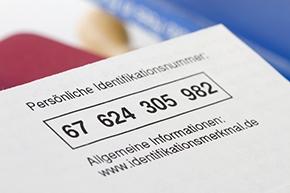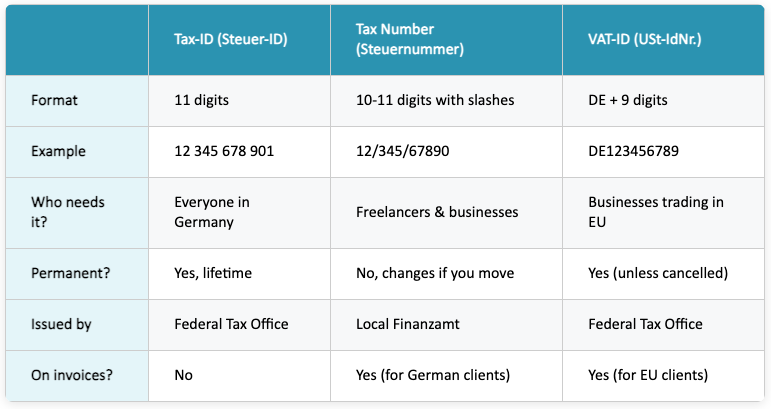
Steuer-ID? Steuernummer? Umsatzsteuer?
Have you ever wondered why Germany needs so many different tax identification numbers? You're not alone. This is one of the most common sources of confusion for people living in Germany, and honestly, it's not your fault — even Germans get these mixed up sometimes.
The short answer: Germany uses three different tax numbers, each serving a specific purpose. Once you understand what each number is for, it all makes sense. Let's break down the three tax numbers you'll encounter in Germany and when you actually need each one.
The three Tax Numbers in Germany: Quick overview
Germany uses three different tax identification numbers, and each serves a completely different purpose:
Let’s dive deeper into each number.

Tax-ID (Steuer-ID): Your personal tax identifier
What is it?The Steuer-ID is your unique 11-digit personal tax identification number. It looks like this: 12 345 678 901.

The most confusing part about this number is that you might also see it called in many different ways:
Do not be intimidated, because all of those definitions are exactly the same thing. So if you see one of those, don’t worry that you are missing another number somewhere - you most likely already have it.
Key characteristics:
When do you need it?
Your employer will ask for this. Without it, you'll still get paid, but you'll pay way more tax temporarily (you can get it back later by filing a tax return, but it's a hassle).
You also need it to:
Common mistake: Some employers think you can't work without a Tax-ID. They're wrong. You can work and get paid, you'll just pay higher taxes temporarily until you get your Tax-ID sorted.
How to get it?
You automatically receive your Tax-ID by mail 4-6 weeks after registering your address (Anmeldung) for the first time in Germany. Or at least, that's how it should work. Many people receive their number months later in the post, or never at all. This is a common occurrence in Berlin. This is not a problem, though.
If you didn't receive it, you can:
If you already have a Tax-ID, you can find it on:

Tax number (Steuernummer): For freelancers and businesses
What is it?The Steuernummer is a 10-11 digit number that typically looks like this: 12/345/67890
Sometimes it's written as a 13-digit number like 3012034567890 (the first two digits represent your Bundesland) - this is though very rarely used.
You might see it abbreviated as:
Key characteristics:
When do you need it?
If you're freelancing or running a business, you need your Steuernummer to
Important: You cannot legally invoice clients without a Steuernummer. You can normally start freelancing and send your invoices retroactively after receiving your number
How to get it?
You get it automatically 2-6 weeks after registering your business or self-employment with your local Finanzamt. You'll do this by filling out the Fragebogen zur steuerlichen Erfassung (tax registration questionnaire).
Important distinction:
Employees do not need a Steuernummer – your Tax-ID is sufficient for regular employment. The Steuernummer is only necessary if you're self-employed or run a business, even as a side activity.

VAT-ID (Umsatzsteuer-ID): Your EU Business Number
What is it?The Umsatzsteuer-ID starts with DE (for Deutschland) followed by 9 digits: DE123456789
You'll also see it called:
Key characteristics:
When do you need it?
This is specifically for business-to-business (B2B) transactions within the European Union. It proves to other EU businesses that you're a legit registered business, not just a private person.
You need a VAT-ID to:
How to get it?
You can request it when you first register your business with the Finanzamt (there's usually a checkbox on the Fragebogen).
If you already have a Steuernummer but didn't get a VAT-ID, you can apply for it separately through the Bundeszentralamt für Steuern.
Important distinction:
Having a VAT-ID doesn't automatically mean you charge VAT. Technically, even Kleinunternehmer (small business owners) can obtain a VAT-ID while maintaining their small business status. However, the Finanzamt will require justification, and using it (especially for purchases) can create complications with VAT returns, so it's generally not recommended unless you specifically need it for EU marketplace requirements.

Quick Reference Chart

What to do if you're still confused?
When your tax situation gets complicated, find a Steuerberater who speaks English. We know this can be challenging, so feel free to contact our partner at German Tax Services - they specialize in helping expats.
Tax tip for health insurance:
Many people don't realize you can deduct private health insurance premiums and other insurances (like liability or legal expenses insurance) from your taxes. These deductions add up, so keep track of your insurance payments.
While we can't provide tax advice, we do help expats find the right insurance setup in Germany. Questions about health insurance options, liability coverage for freelancers, or which insurances are tax-deductible? We're here to help in plain English :)